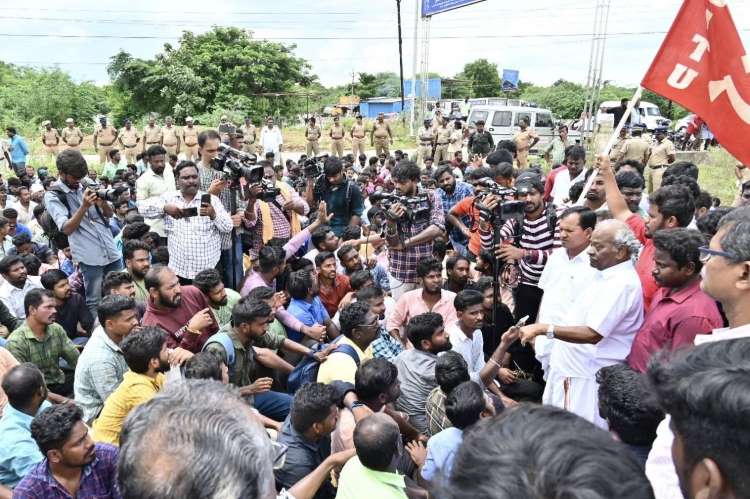Industrial relations in India, particularly in its southern region, have been marked by unrest in the last few months. A series of strikes, first at Trivandrum International Airport and later at Samsung’s Sriperumbudur manufacturing unit near Chennai, have dominated the industrial landscape. While both strikes have now been called off, the events at Sriperumbudur hold implications for the future of industrial relations in India.
The dispute at Samsung’s Sriperumbudur unit began in July when a group of workers, led by the Centre of Indian Trade Unions (CITU), sought to register their trade union under the name Samsung India Employees Union (SIEU). Samsung India opposed the use of its brand name, citing trademark infringement under the Indian Trade Marks Act, and opposed the registration.
Since then, tensions escalated into a full-scale industrial dispute, culminating in a two-month strike that was resolved only after intervention by a ministerial delegation. Samsung India claimed that the strike was provoked by external influences, referring to CITU as outsiders, and stated that the strike had already led to a 50% reduction in production on the first day. Samsung also argued that there was no need for a union, asserting that workers were always free to approach the management directly. Despite these claims, the union remains firm, with its members demanding formal recognition of the SIEU.
READ I Satellite spectrum showdown: Telecom giants face off in auction debate
Samsung union seeks recognition
For the SIEU, recognition by Samsung India is non-negotiable. According to workers, the strike was about workers’ constitutional right to form associations under Article 19(1). They said the strike will immediately end if the demand of union recognition is granted.
The union argues that its application for registration has been deliberately delayed to assist Samsung in avoiding recognition of the union. The broader issue at play here is the legal and existential status of the SIEU as the legitimate representative of the more than 1,800 workers at the Sriperumbudur unit.
Having worked as a conciliation officer for more than 10 years under the ministry of labour and employment, I find the entire dispute at Sriperumbudur to be a misplaced and unnecessary controversy. Emotions have overshadowed a proper understanding of labour laws and employment relations from both sides. The stakes are higher than just the current union-management conflict — India’s reputation as an investment destination and the role of labour unions as social partners in business and development are also on the line.
Legal framework for union recognition
The union’s insistence on recognition appears unfounded when we examine India’s current legal framework. As of today, no law mandates employers to recognise a union for industrial or employment relations purposes. The Industrial Relations Code of 2020, once enforced, may provide such provisions, but until then, recognition remains a voluntary practice governed by the Code of Discipline (1961), which lacks legal force.
The Industrial Relations Code 2020 outlines the conditions under which a union may gain recognition, including having a majority of the workforce as members. However, this code is not yet operational, and the existing laws, such as the Industrial Disputes Act of 1947, do not provide for mandatory recognition of unions. The only relevant provision under current laws is Rule No. 61 of the Industrial Disputes Act, which grants protection to protected workmen from registered unions to carry out union activities without fear of reprisal. However, this does not extend to broader union recognition.
Role of collective agreements
The concept of recognition is crucial because it allows unions to engage directly with management and enter into collective agreements. The Industrial Disputes Act (Sections 18 and 31) provides that any union, whether recognised or not, can negotiate with employers and execute a collective agreement. This effectively legitimises a union’s role in representing workers’ interests, even without formal recognition.
Samsung India has already engaged with the striking workers, many of whom are members of SIEU, and expressed a willingness to sign a collective agreement with them. This shows that, in practice, Samsung has recognised the workers’ representatives as a legitimate bargaining entity, regardless of formal union recognition.
Registration of the union
Samsung India’s opposition to the use of its name in the union’s registration is a procedural matter under the Trade Unions Act of 1936, which falls under the jurisdiction of the Registrar of Trade Unions. While Samsung can contest details relating to its brand, its stance does not necessarily reflect an anti-union position. This issue should be addressed through the appropriate legal channels, and the union’s grievances in this regard seem misplaced.
The union must recognise that union recognition is more about trust and partnership than legal compulsion. ILO reports on social dialogue emphasise that trust and collaboration are the cornerstones of a successful relationship between management and unions. Forceful recognition is unlikely to result in effective and constructive dialogue. Instead, it could fuel management’s fears that the union would become an adversary rather than a partner.
Samsung India must also reconsider its approach. While they have expressed readiness to engage in dialogue with workers, their objection to the union’s use of the Samsung name and concerns over external influences seem overly emotive. Recognising the union could actually strengthen employment relations and boost productivity by providing a structured channel for worker-management communication.
While the immediate dispute may be resolved through external pressure, the underlying issues are unlikely to disappear. Both Samsung India and the SIEU need to adopt a broader perspective and work towards institutionalising a true partnership in employment relations at the Sriperumbudur unit for the long term. Failure to do so risks not only industrial peace but also the larger question of India’s attractiveness as an investment destination.
(Rohit Mani Tiwari is Regional Labour Commissioner, Thiruvananthapuram. The views expressed in this article are personal.)

